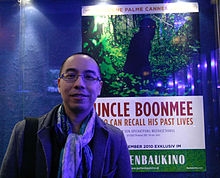Uncle Boonmee Who Can Recall His Past Lives
The film, which explores themes of reincarnation, centers on the last days in the life of its title character, played by Thanapat Saisaymar.
Together with his loved ones—including the spirit of his dead wife, Huay, and his lost son, Boonsong, who has returned in a non-human form—Boonmee explores his past lives as he contemplates the reasons for his illness.
[1] The film was inspired by the 1983 book A Man Who Can Recall His Past Lives by Buddhist abbot Phra Sripariyattiweti.
A hairy, red-eyed figure ascends the stairs near the dinner table, and is revealed to be Boonmee's long-lost son Boonsong.
He recounts a dream of a future civilisation in which authorities shine "a light" on "past people", causing them to disappear.
Uncle Boonmee Who Can Recall His Past Lives is the final installment in a multi-platform art project "Primitive".
The project deals with the Isan region in Thailand's northeast, and in particular the village of Nabua in Nakhon Phanom, near the Laos border.
The project explores themes of memories, transformation and extinction, and touches on a violent 1965 crackdown on communist sympathisers in Nabua by the Thai army.
Regarding the feature film's place within the overarching project, Apichatpong has said that it "echoes other works in the 'Primitive' installation, which is about this land in Isan with a brutal history.
[4] Apichatpong Weerasethakul says that a man named Boonmee approached Phra Sripariyattiweti, the abbot of a Buddhist temple in his home town, claiming he could clearly remember his own previous lives while meditating.
The abbot was so impressed with Boonmee's ability that he published a book called A Man Who Can Recall His Past Lives in 1983.
[4] The stories and production designs were inspired by old television shows and Thai comic books, which often used simple plots and were filled with supernatural elements.
[6] Filming took place between October 2009 and February 2010, as the weather conditions allowed, both in Bangkok and the northeast of Thailand, Isan.
"Every time I release a movie, I lose money because of the advertising and promotion, so I'm not sure if it's worth it, even though I would love to show it at home", Apichatpong said in an interview.
The site's critical consensus reads: "Languorous and deeply enigmatic, Palme d'Or winner Uncle Boonmee represents an original take on the ghosts that haunt us.
To watch it is to feel many things – balmed, seduced, amused, mystified," and continued: "There are many elements of this film that remain elusive and secretive.
[15] In Screen International, Mark Adams called the film "a beautifully assembled affair, with certain scenes staged with painterly composure, and also increasingly moving as the subtle story develops.
"[16] Willis Wong of Intermedias Review called the film "a slow, meditative and often baffling journey visually gorgeous and worth taking.
"[17] Cahiers du Cinéma featured Uncle Boonmee Who Can Recall His Past Lives on the cover of the June 2010 issue[18] and listed it first on their annual Top Ten of 2010.
